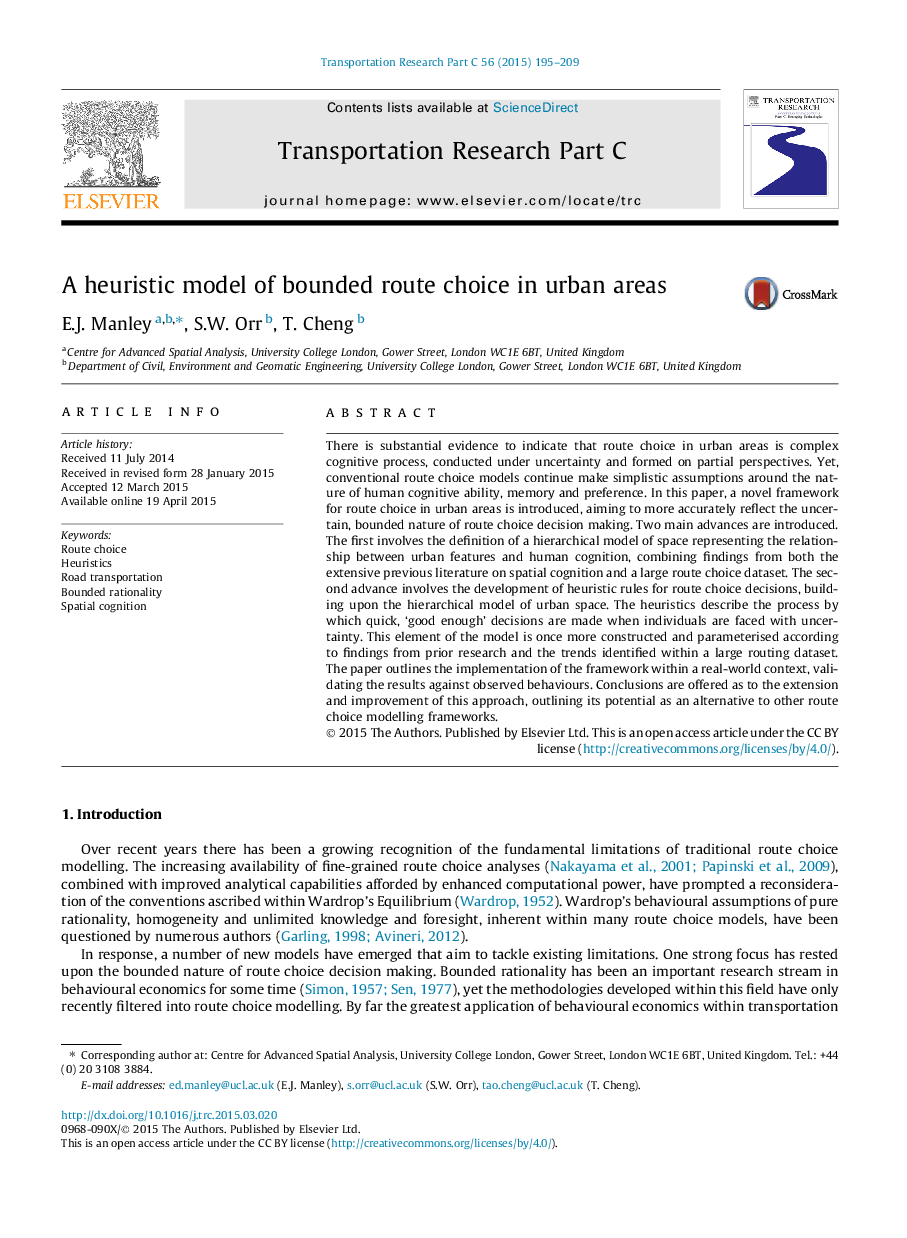| کد مقاله | کد نشریه | سال انتشار | مقاله انگلیسی | نسخه تمام متن |
|---|---|---|---|---|
| 6936743 | 869106 | 2015 | 15 صفحه PDF | دانلود رایگان |
عنوان انگلیسی مقاله ISI
A heuristic model of bounded route choice in urban areas
ترجمه فارسی عنوان
یک مدل اکتشافی از انتخاب مسیر محدود در مناطق شهری
دانلود مقاله + سفارش ترجمه
دانلود مقاله ISI انگلیسی
رایگان برای ایرانیان
کلمات کلیدی
انتخاب مسیر، اهریمنی، حمل و نقل جاده ای، عقلانیت محدود، شناخت فضایی،
ترجمه چکیده
شواهد قابل توجهی وجود دارد که نشان می دهد انتخاب مسیر در مناطق شهری فرآیند شناختی پیچیده ای است که تحت نامطمئن انجام می شود و در دیدگاه های جزئی شکل می گیرد. با این حال، مدل های انتخاب مسیری متعارف، پیش فرض های ساده را در اطراف ماهیت توانایی شناختی انسان، حافظه و ترجیحات ادامه می دهند. در این مقاله، یک چارچوب جدیدی برای انتخاب مسیر در مناطق شهری معرفی شده است که با هدف دقیق تر نشان دادن ماهیت نا مشخص و محدود تصمیم گیری مسیر انتخاب می شود. دو پیشرفت اصلی معرفی شده است. اولین تعریف یک مدل سلسله مراتبی از فضا را نشان می دهد که رابطه میان ویژگی های شهری و شناخت انسان را در بر می گیرد، ترکیب یافته ها از هر دو ادبیات گسترده در مورد شناخت فضایی و مجموعه داده های انتخابی مسیر بزرگ. پیشرفت دوم شامل توسعه قوانین اکتشافی برای تصمیم گیری در انتخاب مسیر، بر اساس مدل سلسله مراتبی فضای شهری است. اووریستی فرایندی را توصیف می کند که با تصمیم گیری سریع و "به اندازه کافی خوب" زمانی که افراد با عدم اطمینان مواجه می شوند، ساخته می شوند. این عنصر از مدل یک بار دیگر ساخته شده و پارامتر بر اساس یافته های تحقیق قبلی و روند مشخص شده در یک مجموعه داده های مسیریابی بزرگ است. این مقاله چگونگی پیاده سازی چارچوب در یک دنیای واقعی را مشخص می کند و اعتبار نتایج در برابر رفتارهای مشاهده شده را نشان می دهد. نتیجه گیری ها در مورد گسترش و بهبود این رویکرد ارائه شده است، و پتانسیل آن به عنوان جایگزین برای چارچوب مدل سازی دیگر انتخاب مسیر است.
موضوعات مرتبط
مهندسی و علوم پایه
مهندسی کامپیوتر
نرم افزارهای علوم کامپیوتر
چکیده انگلیسی
There is substantial evidence to indicate that route choice in urban areas is complex cognitive process, conducted under uncertainty and formed on partial perspectives. Yet, conventional route choice models continue make simplistic assumptions around the nature of human cognitive ability, memory and preference. In this paper, a novel framework for route choice in urban areas is introduced, aiming to more accurately reflect the uncertain, bounded nature of route choice decision making. Two main advances are introduced. The first involves the definition of a hierarchical model of space representing the relationship between urban features and human cognition, combining findings from both the extensive previous literature on spatial cognition and a large route choice dataset. The second advance involves the development of heuristic rules for route choice decisions, building upon the hierarchical model of urban space. The heuristics describe the process by which quick, 'good enough' decisions are made when individuals are faced with uncertainty. This element of the model is once more constructed and parameterised according to findings from prior research and the trends identified within a large routing dataset. The paper outlines the implementation of the framework within a real-world context, validating the results against observed behaviours. Conclusions are offered as to the extension and improvement of this approach, outlining its potential as an alternative to other route choice modelling frameworks.
ناشر
Database: Elsevier - ScienceDirect (ساینس دایرکت)
Journal: Transportation Research Part C: Emerging Technologies - Volume 56, July 2015, Pages 195-209
Journal: Transportation Research Part C: Emerging Technologies - Volume 56, July 2015, Pages 195-209
نویسندگان
E.J. Manley, S.W. Orr, T. Cheng,
